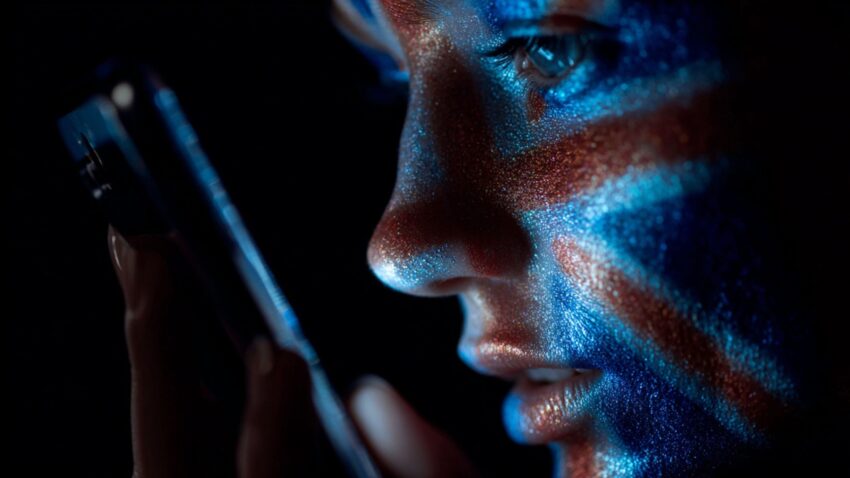If you’re tired of censorship and dystopian threats against civil liberties, subscribe to Reclaim The Net.
What do you get when you mix bad tech, worse policy, and a government that thinks facial recognition is just magic fairy dust? You get the UK’s Online Safety Act, now fully operational, steamrolling through privacy rights like a runaway train.
Officially, it’s about keeping kids safe. Unofficially, it’s the biggest state-sanctioned privacy demolition in modern British internet history. Every part of the rollout, from mandatory face scans to platform-wide lockouts, reads less like child protection and more like a dry run for biometric surveillance as national policy.
This is digital life under government suspicion. Everyone’s a potential threat until proven otherwise.
The main aspect of this legislative car crash is the mandatory age verification regime. To access certain channels on platforms like Discord, UK users are now expected to verify their age using facial recognition or upload a government-issued ID. They’re mandatory gatekeepers now bolted to everything from messaging settings to content filters.
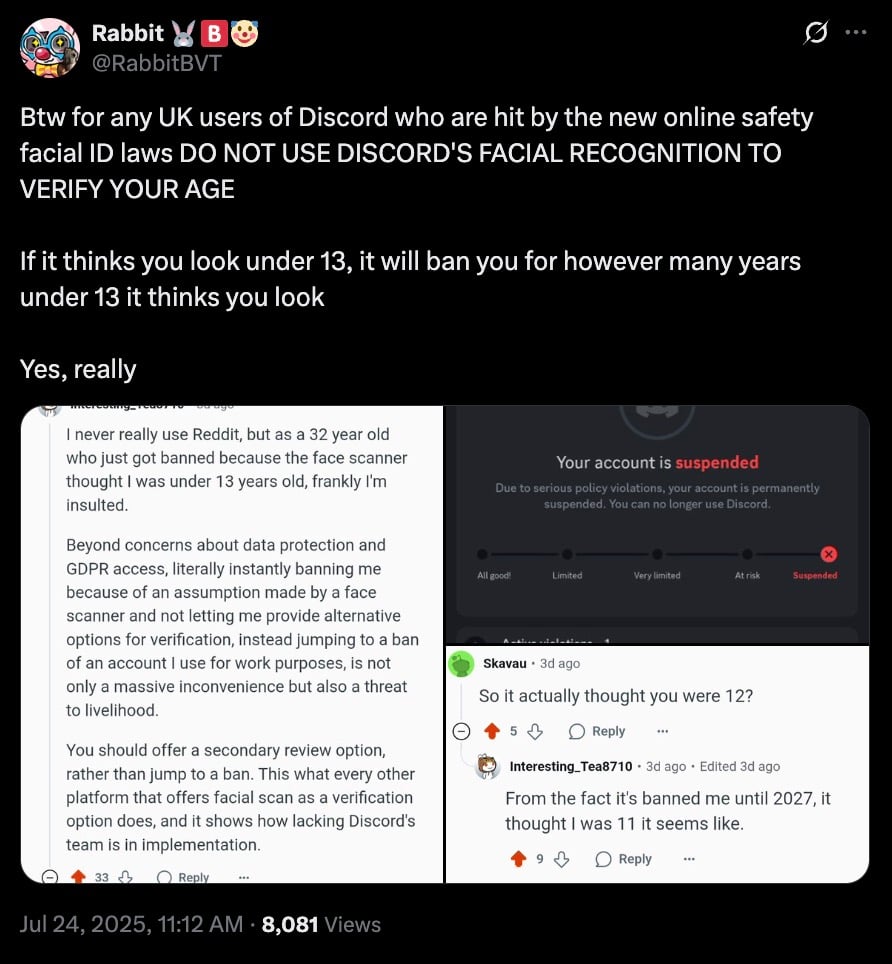
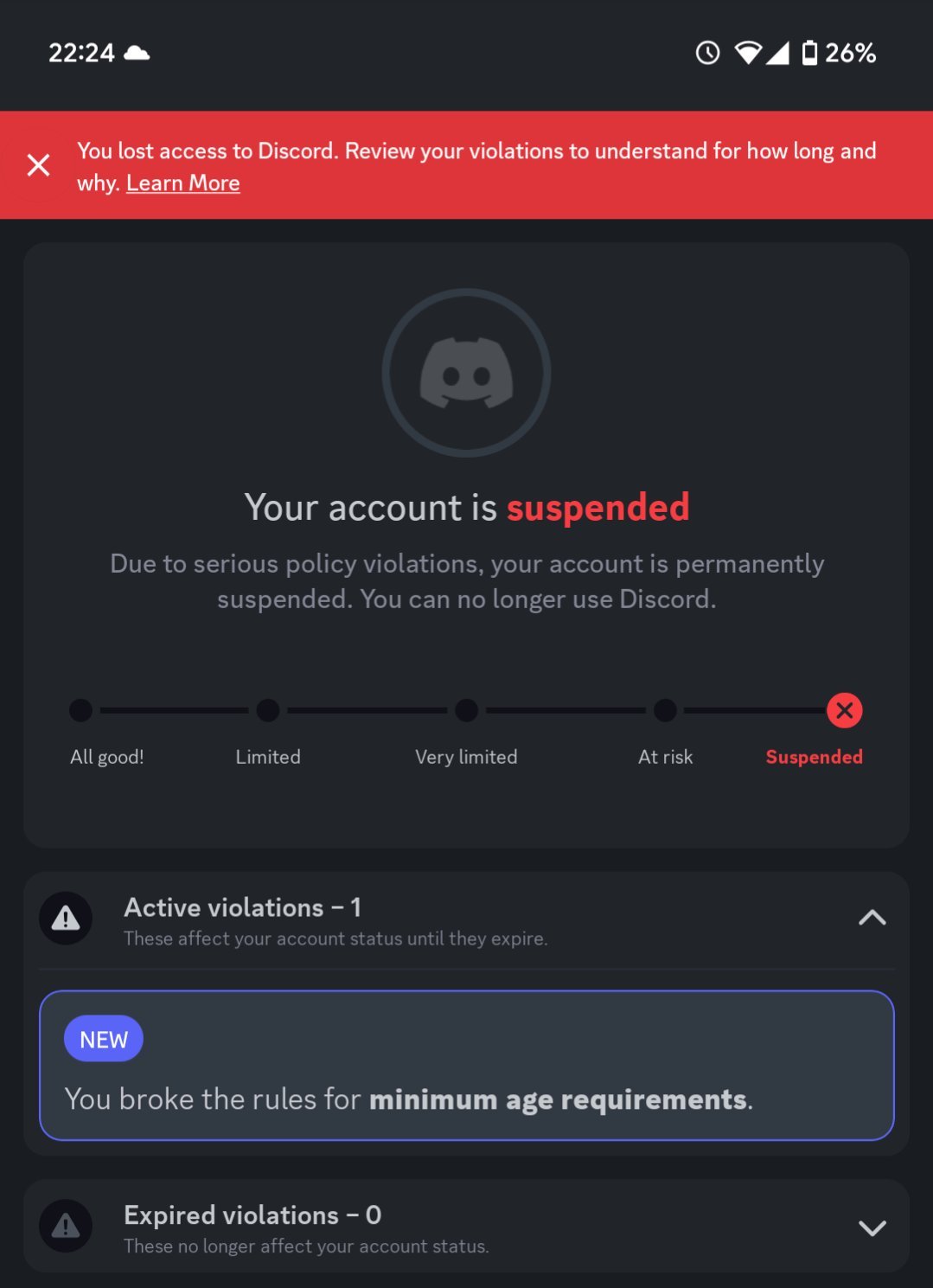
According to Discord, it’s all part of their “privacy-forward” system, a description that does a lot of work for a feature that boots users off the platform for failing a machine’s guess at their birth year.
One such user, a 32-year-old adult, was flagged as under 13 and instantly banned. “Frankly I’m insulted,” they wrote, after the scanner misidentified them and removed access with no possibility for review.
The ban isn’t temporary. It’s indefinite. The only appeal available is to age more visibly.
There’s no human being involved. There’s no process to prove your existence as an adult beyond submitting your face to a machine you didn’t ask for. This is a country that once rejected national ID cards on privacy grounds. Now it’s handing out digital ones through the back door and pretending it’s about safety.
Most platforms don’t even bother pretending they like this. Some are geoblocking the UK. Others are exiting entirely. The ones staying have two choices: implement invasive surveillance or risk government punishment.
Websites are already disappearing. Users are being blocked from subreddits. Even the vague possibility of non-compliance is enough to make companies hit the kill switch on British access. The UK is fast becoming a digital no-fly zone.
And amid all this, the government wants you to believe the real problem is circumvention.
The natural reaction to a surveillance regime is, of course, resistance. And UK internet users have responded with a sudden and passionate embrace of VPNs. Google Trends shows VPN searches exploding. Proton VPN posted a chart with traffic shooting into the stratosphere, adding dryly: “Pretty sure it’s not the footy this time…”
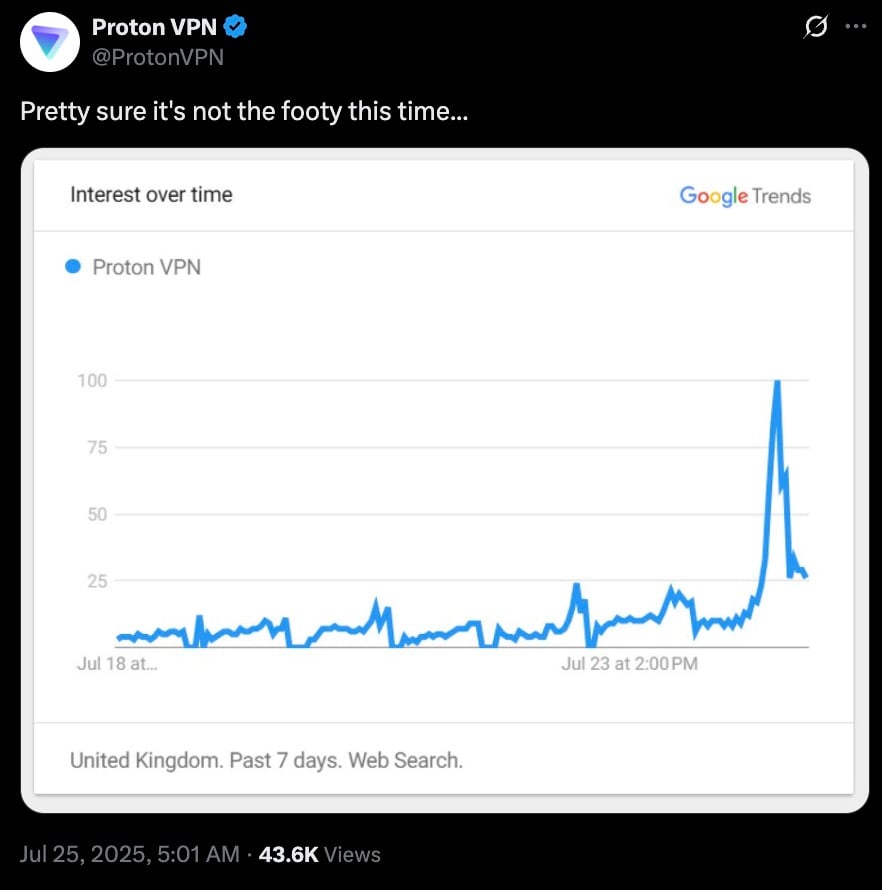
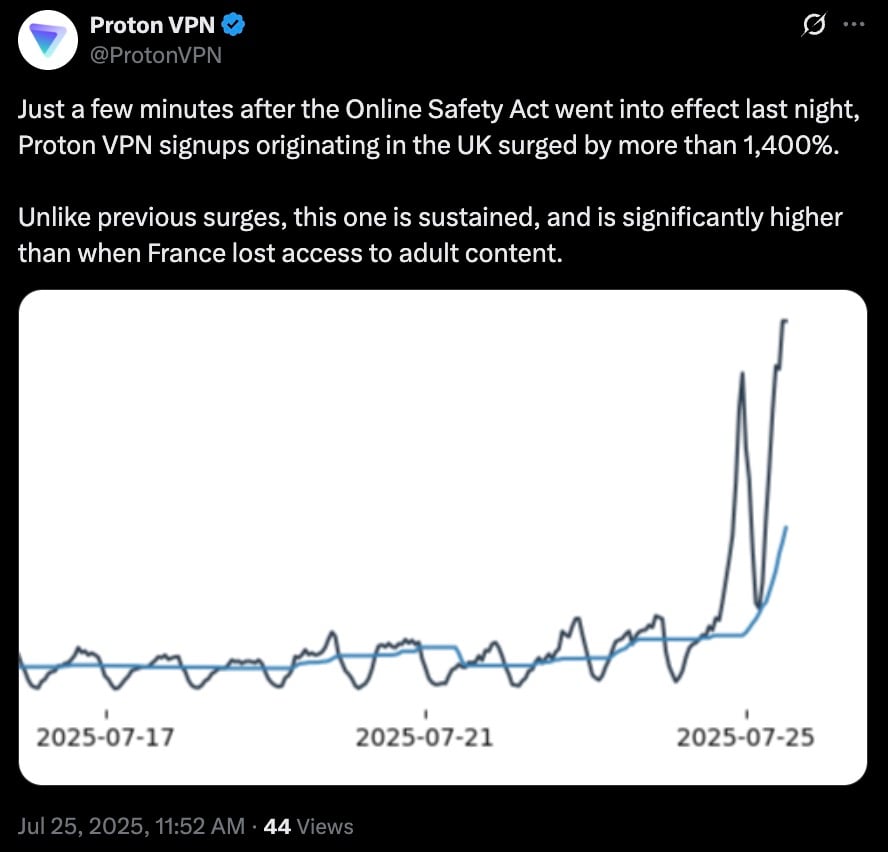
People are trying to claw back a fraction of control over their online lives. They’re doing what anyone under siege would do: finding a way around the walls. But instead of recognizing that maybe, just maybe, the system is broken, campaigners are demanding more bricks.
They’re arguing that allowing people to bypass facial scans and ID checks to access content is a threat to child safety. Apparently, preserving basic privacy infrastructure is now suspicious behavior.
What’s emerging isn’t a safer internet. It’s a monitored one. The assumption baked into the law is that anonymity is a problem to be solved, not a right to be preserved. The choice you’re given is simple: submit your identity or lose access. You can’t speak freely unless you show your papers first.
What started as a bill to stop kids from seeing nasty memes has become a full-on identity control mechanism. The UK government has created a framework where platforms must either track every user’s age or ban them. Privacy is now a liability. And thanks to the vague definitions of what counts as “age-restricted,” any feature, any setting, any filter, can become a reason to demand your face.
In the name of protecting minors, the law treats every user as a minor until proven otherwise. No due process. No appeal. Just an algorithm deciding your adulthood.
The backlash is coming. A petition to repeal the Act has already hit 88,000 signatures at the time of writing, with 100,000 triggering a Parliamentary debate. It’s being signed by people tired of trading civil liberties for broken software and ghosted accounts.
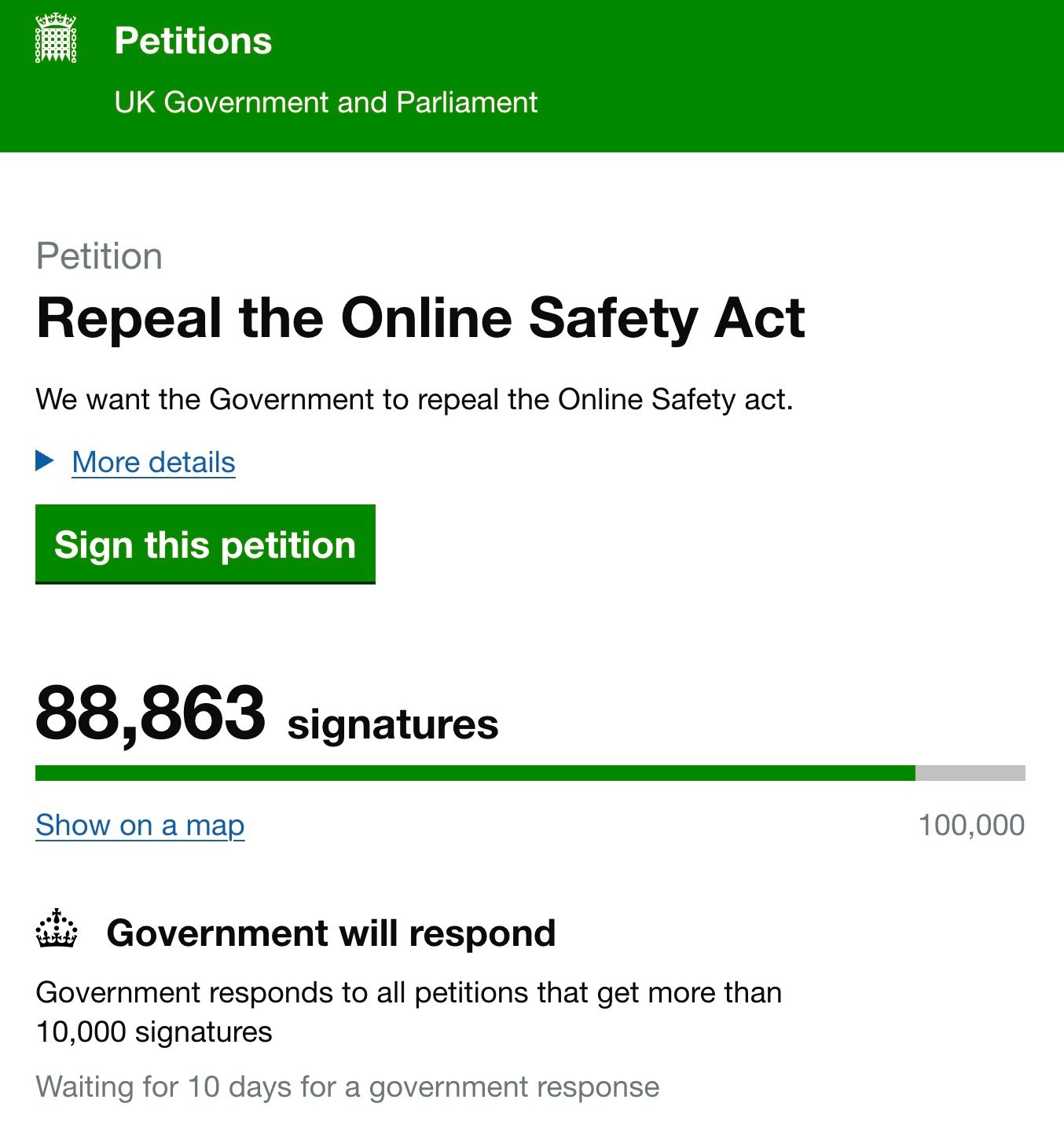
Whether it matters is another question. Parliament passed this law in a fog of moral panic and tech illiteracy. Expecting the same people to undo it would require optimism incompatible with recent British legislative history.
But what’s clear is this: the Online Safety Act isn’t about safety. It’s about control. The kind that forces you to justify your very presence on the internet. The kind that assumes you’re lying unless you scan your face. The kind that punishes privacy like a crime.
And now it’s law.
If you’re tired of censorship and dystopian threats against civil liberties, subscribe to Reclaim The Net.
The post UK Online Age Verification Triggers Chaos, Site Bans, VPN Surge appeared first on Reclaim The Net.
Click this link for the original source of this article.
Author: Christina Maas
This content is courtesy of, and owned and copyrighted by, https://reclaimthenet.org and its author. This content is made available by use of the public RSS feed offered by the host site and is used for educational purposes only. If you are the author or represent the host site and would like this content removed now and in the future, please contact USSANews.com using the email address in the Contact page found in the website menu.

